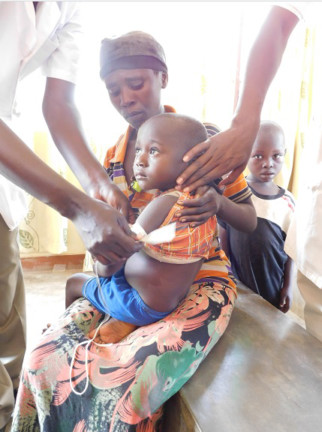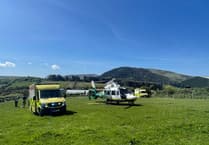Louise Whitelegg, the island’s Christian Aid co-ordinator, has just returned from a month-long, self-funded trip to Burundi in east Africa. In this the second in a series of articles, Louise looks at the importance of faith in what is one of the world's poorest countries.
Like the Isle of Man Burundi is a small community where everyone knows everyone else.
While our island is surrounded by sea, Burundi is land-locked and isolated by rocky relationships with its neighbours.
The country, again like the Isle of Man is of Christian faith. In Burundi 80-90% of the population are Christian.
During my visit I was able to meet with many different denominations and faith groups.
Whatever your view of religion, faith is a cornerstone of life in Burundi and I was left with the strong feeling that without this faith there would be far more misery, than hope.
The pure faith and spirituality that I witnessed as I travelled around this fabulous country was breath-taking.
I went with the intention of being the helper, but was left feeling more helped by the stories of resilience and courage I encountered.
I cannot help but think we have a lot of things wrong in the west. We have a tendency to be blinded by the latest thing, the keeping up with the Jones’s, the constant striving for more.
In Burundi, I met people with nothing, no access to clean water, no access to health care and even no idea where their once daily meal was coming from.
Yet, they accept the stranger into their home, whether a white visitor, the refugee from neighbouring Congo or a baby thrown away as rubbish. All are met with a ready smile and those in need are welcomed comforted and fed with whatever they have.
One of the first people I met was Bishop of the Methodist church of Burundi.
This Church has recently been through some very challenging times.
In 2005, after the passing of the former Bishop, the western African conference elected a Sudanese leader for the Burundian Methodist Church. He stood on a mandate of peace and reconciliation.
However, being an outsider, the Burundians did not react well, as they wanted a Burundian Bishop so this caused a great rift in the church.
In 2016 elections were held for a new bishop and Bishop Jean was appointed. During my visit the Annual Burundi conference took place where the Methodist church was reunified, taking the organisation from 306 churches to 400 with a presence in 14 of the 18 provinces.
Burundi is recovering from years of political unrest. During the war in 2015, Bishop Jean’s church was one of the few that stayed open in faith, while everyone else in the city fled.
From a regular congregation of 280 there were only 12 on the worst Sunday (the church is situated one of the worse conflict areas) November 8, everyone else had run away in fear of their lives.
The small, but strong congregation stayed and worshiped as guns and mortars went off in the streets around them and clouds of tear gas filled the church, searing throats and stinging eyes.
Reflecting on this event, Bishop Jean told me that it was ‘a good job’ they had stayed as the other churches and buildings that were not occupied where ransacked and destroyed by the crowds.
Many of the other churches did not recover from the devastating theft and damage to property.
I had the pleasure of participating in two Sunday services during my time in Burundi, one at the English/French speaking Pentecostal church and one with the Kurundi speaking United Methodists.
Both were like nothing I have ever encountered before, with the services lasting between three and five hours.
I witnessed many examples of faith in action. But there are some stories that are too strong to ignore.
While visiting a children’s malnourishment clinic run by the Anglican Church in the south of the country I met Jacquline and her two children.
Her story is heart-breaking and inspirational, it truly forces you to look at yourself and ask, would you do the same?
Minani Jacqueline, 28, said: ‘I have walked for two hours with my two babies to get to the clinic this morning.
‘This is why I was one of the last to get here and I am still waiting for the test results. My youngest child is my baby and the older one I adopted. I was at the market buying food and I found him in the bins at the back of the market in the rubbish.
‘He was very freshly born and still had his birthing covers and cord.
‘I did not see the mother, but I am sure she was close by watching to see who God sent to look after her baby. So, I picked him up and took him home with me. My husband and I had been trying for a baby for a long time and this felt like it was the thing I should do. God had given me this child.
‘Shortly after I adopted my baby, I became pregnant so I know I did the right thing.
‘My husband is a fisherman, and one night, when I was pregnant, he left for work and did not come back.
‘I do not know what happened to him but I think he has run away. He did not take good care of me.
‘I live in rented accommodation and I have no land. So, I live on selling the wood that I can collect from the forests. I barter this for food or money.
‘I struggle to find enough money to feed my family and being taken on at this clinic has been a great opportunity to secure the health of my children.
‘When we first came here I was really worried about them. Their arms were so thin and although their tummies where big they never seemed to weigh more when I carried them.
‘Now, they are holding a little more weight and have more energy than before. I thank you for the help this clinic has given me and the kindness of the doctors.
‘I know that people care about my children and that I am not on my own.’
This year’s Christian Aid Week appeal (May 13-19) is a health promotion project in the north of the country raising funds to provide health education DVDs with our partners Thare Machi Education (registered Manx charity).
We are hoping to raise funds to purchase bicycles, DVD players and solar panels to enable and train ladies to take these educational messages in to remote villages.
If you would like to help or learn more about this year’s Christian Aid week collection or if you would like to organise a talk, then please contact Louise on 474275 of [email protected]

.jpeg?width=209&height=140&crop=209:145,smart&quality=75)
.png?width=209&height=140&crop=209:145,smart&quality=75)


Comments
This article has no comments yet. Be the first to leave a comment.